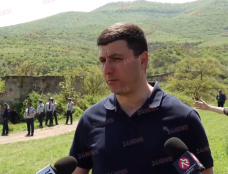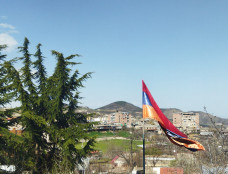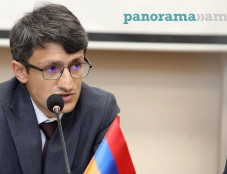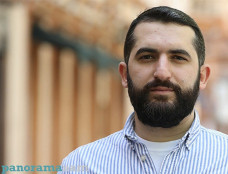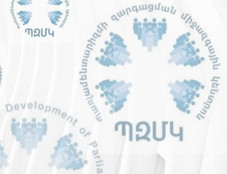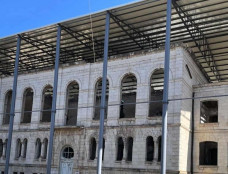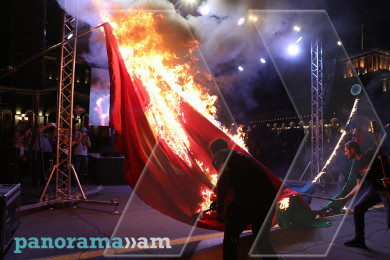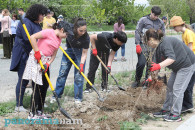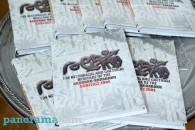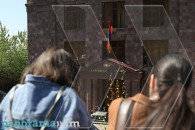
26 years after genocide in Baku: “Baku received order from Moscow not to intervene in pogroms and allow them easily slaughter Armenians”
Panorama.am has already reported that a collection book Baku Tragedy: Eyewitness Accounts is to be published in the frameworks of the project Ordinary Genocide. It will include the interviews of about 50 refugees currently living in the US who speak about their memories. ‘A Century-Long Genocide. Black January of Baku, a film, whose presentation took place a year ago, was made based on those accounts.
To commemorate the 26th anniversary of the genocide of the Armenians in Baku, Panorama.am goes on publishing chapters from the future book, provided to the website by Marina Grigoryan, the manager of the project an Ordinary Genocide.
Garik DADYAN
I’m a native Baku resident. My parents were born in Baku, as well. Grandfather arrived here from Goris back in 1920s, grandmother was born in Madras, a village in Azerbaijan a hundred kilometres from the capital. My father was a well-known constructor in Azerbaijan. He constructed the Intourist hotels, the building of the Ministry of Internal Affairs and headed the construction of Bina Airport. His name was Eduard Arturovich Dadyan.
All those events in Baku started in 1988. To start my story, the Tula Division was in the city, and I was acquainted with its deputy political commissar, Vladimir Manyuk. He was interested in arts, and we made friends on this ground. Manyuk often came to my workshop and my home. It was somewhere at the end of 1988, near 1989. That is, ‘Sumgait’ had already happened, and there were periodical outbursts of violence in Baku. I know for sure that the militant groups organised across the whole territory of Azerbaijan and acting particularly in Baku had lists of addresses of the Armenians’ flats. And they went armed to concrete addresses. It wasn’t done at night in secret, they went in broad daylight, openly, in front of the militia’s eyes, and openly slaughtered and tortured people.
I managed to be saved totally by chance. This is how it happened. We sat at home understanding that an attack as unavoidable. We just didn’t know when it would happen, when our family’s turn would come. And when the day came, lieutenant colonel Volodya Manyuk, my friend, came to our place (and it must have been just a miracle). He just came to have some tea, as he usually used to come to talk. Literally a minute after he came, the militants attacked us. They didn’t burst inside immediately, but organised a kind of reconnaissance first. Two of them knocked at the door, and when we opened it (it was impossible not to open), they saw the military man sitting in out flat. Manyuk, of course, was wearing uniform and was armed; they all wore uniforms at that time. When the attackers saw a military man at our home, and a lieutenant colonel rather than a private, they left. But my neighbours later told me that they hadn’t really left. We had a very big yard, and there were 30 or 40 of them. The rest were waiting in the yard, while those two were on reconnaissance.
Thanks God, we had a phone at home. Volodya at once called the headquarters nearby, at the city committee. And they immediately sent help to us – four soldiers armed with assault rifles. Volodya said the only thing he could do was to leave the soldiers until I packed my things, and then they would accompany us to the ferry. And these soldiers saved us, the militants did not dare to attack anymore and cleared off from the yard. But the pogromers came back later thinking that the soldiers had left. The vehicle that was to take us to the port stood in three metres from the house, and I was loading the things. They saw this and came up. The soldiers immediately came out to the yard. Here, the pogromers infuriated not to be able to murder and rob us (and I had a very rich flat, expensive furniture, something they knew about). Well, they perfectly knew where they were going, they knew what there was to take away. Enraged of the failure, they grew so impudent that one of them took out a knife, swung against a soldier’s face and said, “You came here to protect the Armenians, so we’ll slaughter you, too.” The soldier stood calm and silent. And they had to turn and leave. The soldiers accompanied us to the ferry, and we got to Krasnovodsk. We immediately decided to go to Moscow. First, I flew alone, while my family stayed with the relatives there.
The Armenians gathered by the Armenian Church in Moscow at those times, the refugees and those who addressed all those issues. People shared what they had seen and heard about the Baku events. It was there that I first heard about the story with the ferry, about the awful things that had happened in 1989 when we had already left the city. The eyewitnesses that had miraculously been saved told us about that. There were about a thousand refugees, Baku Armenians, on the ferry. When they were already out in the sea, two military ships attacked them. The militants rushed onto the ferry and started killing and throwing the Armenians into the sea. Only those who managed to somehow hide could survive.
So, in Moscow, we formed a group of six people headed by Professor Sarkisov, if I’m not mistaken, to negotiate with the government. He was an old man, thin and not very tall. We gathered about 200 or 300 refugees, invited correspondents from the Voice of America, RFE/RL, and other representatives of the foreign press, and went to the waiting room of the Supreme Council in the Manege. And we started to demand a face-to-face meeting with Gorbachev. By the way, only the foreign journalists’ presence saved us from an arrest. We said if they didn’t organise a meeting with Gorvbachev, we would block the street. Otherwise, no one would talk to us at all. Some people were coming out of the waiting room and speaking to us very rudely, ordeing to disperse at once. We felt that it was only the presence of the foreign journalists that made them restrain themselves, they were even a sort of afraid. At last, a group of six people was allowed to enter the waiting room, where military men took our passports. This frightened us awfully, of course. They ended up in agreeing upon our conditions and said, “Well, you’ll have Gorbachev.” But this was a lie. Their aim was to disperse the refugees, so that we couldn’t block the street. That is, they needed to get rid of us as soon as possible.
We rose to the second or third floor. We were let into a big beautiful office with an enormous quantity of phones. Still it wasn’t Gorbachev who came in, but two politburo members. Unfortunately, I don’t remember their surnames. They started shouting and being rude to us. We said people are being slaughtered, murdered over there, while they responded, “No one is being slaughtered, you have made up all that story. It is a nonsense. We control everything, and you are just hooligans. Leave the place immediately!” We told them we would block the street. To tell the truth, nothing mattered to us anymore, though we knew that they could arrest us, jail us, and do anything with us. We understood just one thing – people were being slaughtered over there, in Baku, and we had to save those people. They said all right, Gorbachev will come now. We waited. They told us that Gorbachev was away in holiday in Faros and that Primakov was in charge of the president’s affairs.
And Primakov came. He met us like his own people, he almost hugged everyone, meanwhile falling into distress, “Oh, what happened there! We’ll now take measures.” A whole retinue came with him. Those two politburo members that had been shouting at us came as well. A young man looking like an Armenian came in front of them along the corridor. What Primakov first told us, was, “He is my deputy. He is one of you, a Baku Armenian.” But when we demanded that he immediately stopped the genocide in the territory of Azerbaijan, Primakov’s response was completely different. He behaved very strangely. He started in very friendly terms, shouted at those two politburo members and others. And we believed, we were glad thinking that they would now take up measures. Then he got up, went up to one of the phones, called the Defence Minister Yazov and started to speak to him very strictly. He said six representatives are sitting here, what an outrage is going on in Baku… As far as I can remember, he said he ordered him to send there additional troops and stop the disorder. I don’t know who was on the wire, Yazov or someone else, or if there was really someone or he spoke just into the empty receiver. But he ordered to stop everything, and we believed and were glad.
Primakov came back and sat by the table right in front of me. I said, “Thank you, we are pleased with the negotiations. Thank you for taking measures, but we shall control the situation. Will shall call to Baku and control.” He told me, “Don’t you believe in me?” I answered that we believed but that it was extremely serious and that is why we would control. And we left. Later, I leant details from Volodya Manyuk, who I met already in Moscow. I told him about the meeting with Primakov and asked, “Have you received such an order?” He said, “Yes, we received, but it was an order not to intervene in the events.” At our presence, Primakov had actually ordered to stop the events on the phone, but Baku received the real order not to intervene, that is, allow them easily slaughter the Armenian population. Slaughter rather than just deport.
In Moscow, I was acquainted totally unexpectedly with a retired KGB colonel, Vyacheslav Sergeevich. I’ve already forgotten his surname. He was heading the KGB group, which had arrived in Baku form Moscow in late 1980s. I spoke with him very thoroughly on that topic. I asked him if they knew about the genocide in Sumgait, Baku. He said, “Yes, of course we knew.” They knew when it would start, even since Sumgait, they even knew the day… They reported both to the government in Moscow and to the KGB chief Kryuchkov. They knew everything, everything. I asked him, “Where were you at the moment when the massacre started in Sumgait?” He said they were ordered to go fishing. That is, the head of the KGB group in Baku went fishing perfectly being aware that Armenians were being murdered in Sumgait. He knew it all, he transferred information to Moscow from Baku, he reported about the situation. I repeat, he told me Moscow knew the day and the time the genocide in Sumgait would start.
When he told me about all this, I decided to invite Vahan Emin, the editor of the Armyanskiy Vestnik, a journal published in Moscow. He immediately inflamed, “Lets hold an interview with him.” They two came to my place. Vahan hid his microphone somewhere. It was in 1990 or maybe already 91, I don’t remember for sure. We sat by the table, I acquainted them and said, “Vladislav Sergeevich, tell us please about what you have told me.” And he answered, “I haven’t told you anything. There was nothing like that.” He guessed, he understood everything, the old KGB-man. He told me later that he had no right to voice that information for 25 years.
I will also add something about my father’s second wife. The militants seized her and took to some concentration camp. They had organised something like a concentration camp in Baku suburbs, where they held people like slaves. It was a miracle that they released her; she had a disabled child. The woman’s name was Seda. She then died in Yerevan.
Seattle, Washington, US. 29 March 2014
A mass pogrom of Armenian population was committed in Baku from 13 to 19 January 1990 as a culmination of the genocide of the Armenians in Azerbaijan unfolded between 1988 and 1990. After the Sumgait pogroms (26-29 February 1988), persecutions, beatings, particularly cruel killings, public mockeries, pogroms of separate flats, seizure of property, forcible expulsions and illegal dismissals of Armenians started in Baku. Only some 35 or 40 thousand Armenians of the community of 250 thousand remained in Baku by January 1990; they were mainly disabled people, old and sick people and the relatives looking after them. The pogroms took an organised, targeted and mass nature since 13 January 1990. A large amount of evidence exists about the atrocities and killings committed with exceptional cruelty, including gang rapes, burnings of people alive, throwing people out of balconies of higher floors, dismemberments and beheadings.
The exact number of the victims of the genocide of the Armenians in Baku still remains unknown. According to different sources, between 150 and 400 people were murdered, and hundreds were left disabled. The pogroms went on for a week amid a total inaction of the authorities of Azerbaijan and the USSR, as well as the internal troops and the large Baku garrison of the Soviet Army. Those who managed to avoid death were forced into deportation. The Soviet troops were deployed to set order in Baku only on 20 January 1990.
For more detail, visit KarabakhRecords
http://karabakhrecords.info/ru/home-3/
http://karabakhrecords.info/ru/home-3/
Related news
- 26 years after genocide in Baku: “Someone informed pogromers that young Armenian woman hid in that house, and they came after me…”
- ‘History repeats itself…’ ‘A Century-Long Genocide. Black January of Baku’ film screened in Richmond
Newsfeed
Videos






